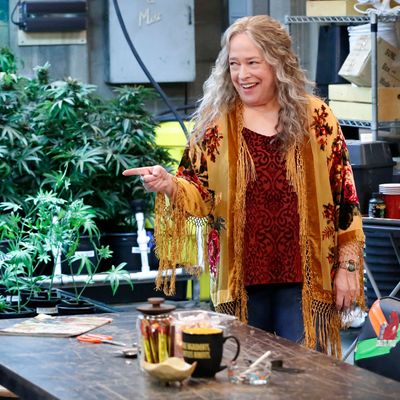
Disjointed is a CBS sitcom that smoked a little weed, wandered away from its home network, stumbled onto Netflix, then looked around and said, “Cool, I’m on Netflix now. That means I can say fuck.”
Co-created by Chuck Lorre, the megaproducer responsible for CBS comedies like Two and a Half Men and The Big Big Theory, and former Daily Show writer and producer David Javerbaum, it’s also a half-hour series about life at a medical-marijuana dispensary with a tremendous star in Kathy Bates but, as implied above, a bit of an identity crisis. In most ways, Disjointed adheres to the usual Lorre template: It’s a standard multi-camera show with a studio audience laugh track and jokes that tend to be unimaginative (so many gags about stoners being out of it), basic, or a tad tasteless. Example: In the first few minutes of episode one, Jenny (Elizabeth Ho), an Asian-American employee at Ruth’s Alternative Caring, introduces herself to camera with: “Hey, I’m your token Asian.” The sensibility of Disjointed is basically: When we get high, we also go low.
But Disjointed is also keenly aware that it’s on a streaming platform that gives it more freedom than CBS. Hence, the S-word and F-bombs are liberally sprinkled into the dialogue, which is jarring at first. (Imagine watching a show like The Big Bang Theory and suddenly hearing Sheldon say, “Fuck that shit.”) There are also creative little experiments with the opening titles, which are altered in certain episodes, and some occasionally amusing fake commercials for pot-related products, though even those are reminders of the advertising/act breaks typical of network TV. Brief detours are taken, too, into animated flashbacks that bring to kaleidoscopic life what’s happening in the mind of dispensary security guard Carter (Tone Bell), an Iraq War veteran who, in the show’s most affecting story line, suffers from PTSD.
The comedy’s strongest asset is, not surprisingly, Bates, who puts a more wry spin on the crunchy, baby-boomer hippies she’s played before on Six Feet Under and in the film About Schmidt. As Ruth, a New York native and former activist who still thinks of smoking marijuana as an act of defiance as well as a therapeutic pursuit, she’s perpetually getting mildly high on her own supply while infusing every predictable zinger with enough tangy juice to make it land. She’s also wonderful in more serious scenes with Bell, as she gently counsels him to alleviate the stress that’s weighing him down. (Spoiler alert: Yes, alleviating that stress does involve using pot.)
Aside from Bates and Bell, the rest of the cast doesn’t register as strongly, at least in part because their characters aren’t as sharply developed. In addition to Jenny, whose chief characteristic is that she’s lying to her parents by pretending she’s a doctor, there’s Pete (Dougie Baldwin), the on-site herb grower who talks to his plants like they’re his children; Travis (Aaron Moten), Ruth’s son and the manager of the shop; and Olivia (Elizabeth Alderfer), another employee who, at least in the few episodes Netflix made available in advance, seems to exist primarily to serve as a love interest for Travis. A lot of the more scene-stealing moments of comedy are handed to peripheral characters, like Dank and Dabby (Chris Redd and Betsy Sodaro), the burn-out husband-and-wife hosts of a YouTube pot series, and Maria (Black-ish’s Nicole Sullivan), a weary suburban mom who becomes a regular customer. (“Maria, you’re not alone,” Ruth advises her during her first visit, as she describes the white-privilege pressures of dealing with her family. “In fact, you’ll be happy to know that you’re a stereotype.”)
The conflict between Ruth and Travis over how to run and promote Ruth’s Alternative Caring raises some interesting issues about how different age groups view marijuana use. Even though she runs a shop that dispenses a plethora of herbs and edibles, Ruth still has a hard time seeing marijuana use for the normalized, potentially profitable business it’s become, while Travis approaches it with the same practicality he would any other potential enterprise. That’s an interesting intergenerational disconnect that other recent shows about cannabis, such as HBO’s High Maintenance, have not yet explored in full. Without seeing more episodes, though, it’s hard to know how deeply or meaningfully Disjointed digs into that terrain.
Based on what I have seen, Disjointed is a series that takes some minor risks but more often caves into the laziest of sitcom clichés. The degree to which you appreciate it will depend largely on how much you’ve enjoyed other previous Lorre works. If you were a massive Two and a Half Men fan, a series on which Bates guest-starred, and were never bothered in the least by its lowest-brow moments, you’ll probably be fine with Disjointed, though the idea of anyone bingeing all 20 episodes in a sitting or even a weekend is hard to imagine. Then again, if you partake of some product and can’t peel yourself off the sofa long enough to stop Netflix from auto-advancing through every episode, you can probably fly through it faster than it takes a cloud of pot smoke to dissipate. Actually, maybe that’s exactly what Netflix is counting on.


